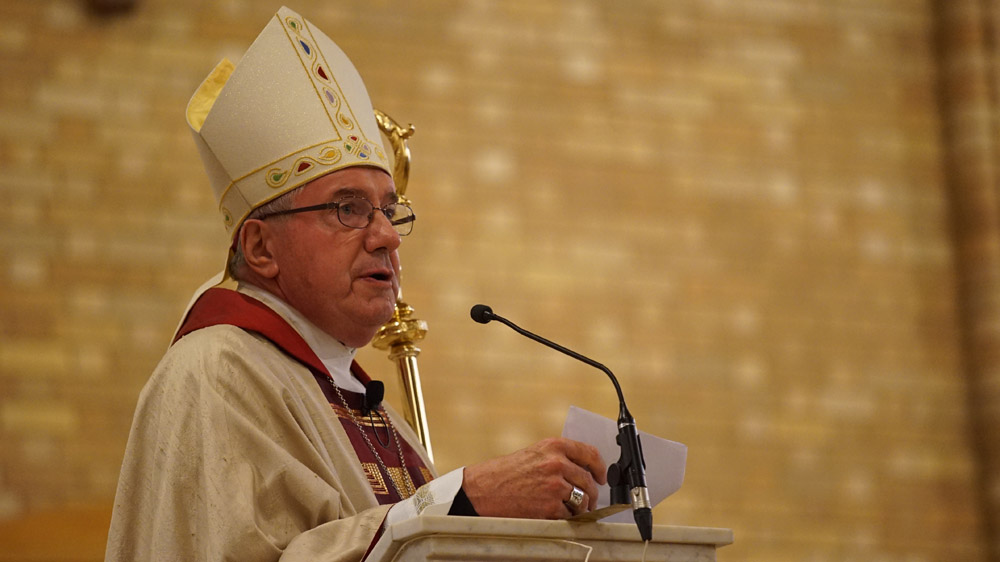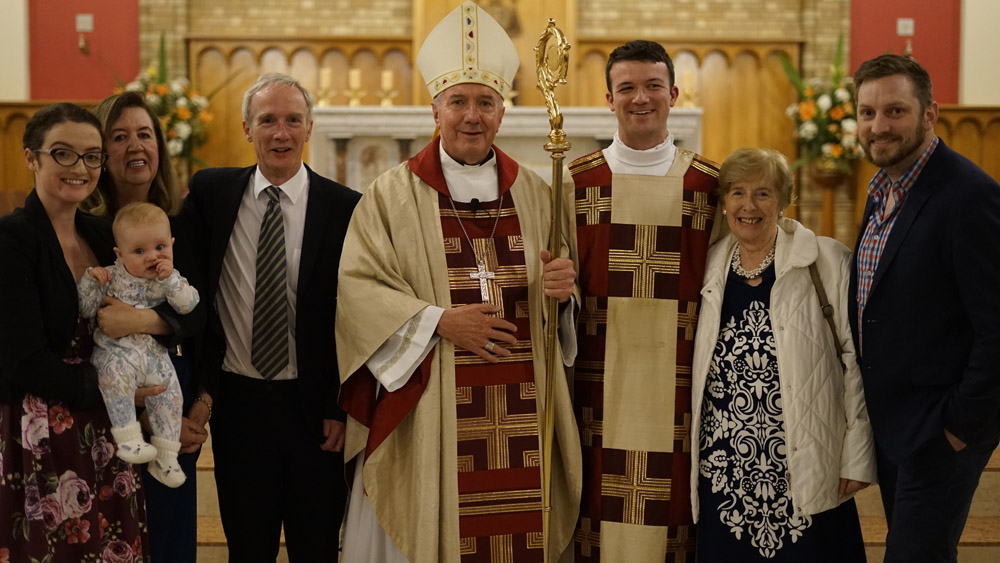 
.
ARCHBISHOP CHRISTOPHER PROWSE’S HOMILY
DIACONATE ORDINATION OF ALEXANDER OSBORNE
ST CHRISTOPHER’S CATHEDRAL
FRIDAY, 23 NOVEMBER 2018
Readings
Jeremiah 1:4-9
1 Timothy 4:12-16
Gospel: John 17:6-21
We welcome Alexander Osborne on his Ordination to the Diaconate. We particularly welcome his family gathered here tonight. We thank the great generosity of his family and parents Peter and Sylvie for nurturing him in their family life and their openness in helping him to reach this important moment of grace tonight.
In a particular way, we welcome his grandmother, Joy, who has come from England especially for this ceremony. His siblings Louise and Adam we also particularly acknowledge along with parishes and priests of the Archdiocese.
A special grateful welcome again to our friends from the Good Shepherd Seminary in Sydney. The Rector is here, Fr Danny Meagher, and staff members, Arthur McGivney and Seminarians.
Vocations are born in families. It echoes the beautiful reading from Jeremiah tonight that “before I formed you in the womb I knew you before you came to birth I consecrated you.” It’s always grace that precedes all else, especially in regard to the Diaconate call to service in the Church.
I’d like to reflect a little on the Diaconate in the light of the scriptures tonight.
When we come to reflect on leadership in the Catholic Church we have an immediate problem. The word leadership in not really a biblical word but comes from the corporate world.
The nearest biblical word to approximate what we are celebrating tonight is the word “Diakonia.” This biblical word can generally be interpreted as service.
Clearly, all service in the Church derives from our baptism. In our baptism we become members of Christ’s Body and share in Christ’s Priestly, Prophetic and Kingly Ministry.
It is perhaps Pope Benedict XVI in his wonderful encyclical, Deus Caritas Est, who broadens our understanding of service and links it to the Church’s deepest identity. In this encyclical (paragraph 25) he uses three expressions in an expansive understanding of the word “service.”
Firstly, there is service from the “front.” It particularly expresses the prophetic dimension of our baptism. The word Pope Benedict uses is the expression from our ancient history: “Kerygma-Martyria.”
We see in the Second Reading from tonight how the preaching, teaching and proclaiming of the Word of God is central to all service, particularly for those to be ordained Deacon. The vision here is that our mission is to be Evangelisers that call forth conversion and prayerful transformation in people to the Living Word of God.
In the Second Reading from St Paul’s letter to Timothy we read: “take great care about what you do and what you teach: always do this and in this way you will save both yourself and those who listen to you.” Such fundamental preaching of the Kerygma gives vision to people and a compass by which they can direct their lives to an encounter with Jesus from whom all blessings flow.
It is interesting to note that “Kerygma” is linked with the word “Martyria” from which we get words like “Martyrs.”
We celebrate today, the martyrdom of St Clement of Rome. He was one of the early Popes. He was martyred by his detractors when they fixed an anchor to his body and cast him into the Black Sea. Preaching the “Kerygma” can sometimes lead to martyrdom by blood.
The other Saint that we recall today universally is St Columbanus, the great sixth century Irish abbot. His was not a martyrdom by blood but he endured a kind of martyrdom by exile. This Irish monk was an evangeliser of present day France…he seemed to have bypassed England! He was exiled and had many trials in his life.
Even today the “Kerygma” of his initial proclamation of Jesus still resonates throughout the world, particularly through the Columban Fathers and Sisters to which Australia has great links.
Secondly, there is service from the “middle”. That is, it is a service of making sure that the community comes together in the unity of Christ. The word used here is “Leitourgia.” From it is derived the word “Liturgy.” In celebrating the Sacraments we continue the Priestly Ministry of Christ and we bring all into unity in Christ.
As a Deacon, Alexander, you will be called to preach and to baptise in the name of the Church in her Sacraments. May you always be a Deacon that unifies people and never deliberately scatters them.
Thirdly, there is service from the “back”…for those who are struggling to keep up with everybody else. Here, the Kingly dimension of our baptism is expressed. The word used for this is “Diakonia.” Strictly speaking, it refers to practical charity.
Alexander, you will join the Deacons from biblical times whose particular duty was to care for the three “L’s” in society…the Lost, the Last and the Least. It will be a ministry in practical duty. You are to spend time and energy making sure that the Lost are found, the Last become first in your priorities, and the Least are given the greatest amount of your loving and prayerful attention.
In doing this you are living out the Gospel of tonight which indicates Jesus’ desire of us to be sent out into the world. St John proclaims: “I have sent them into the world and for their sake I consecrate myself that they too might be consecrated in truth.”
St John says that we are sent out. We are not sent in. Deacons, like all Christians, should monitor how much time they sit in front of computer screens and on couches in front of televisions. We are never to be lazy, we are to be full of Gospel energy and practical charity to those who need us.
This teaching from Pope Benedict is capturing our ancient Christian traditions and synthesising them into those three expressions which you will find a particular way of living out, dear Alexander, in your time as a Deacon.
At the same time, be aware of the three dangers to service. We might call them the “unholy trinity”…it is “the me, the myself and the I”
Firstly, beware of the poison to service which makes “me” think of myself as holding a particular position in the Church: some sort of superior, privileged class that others should look up to. This is the type of Ministry which refuses to live out baptism. It can easily lead to seeing yourself in an elitist class or superior to others. Such forms of clericalism are to be avoided at all costs.
Then there is the “myself.” This is a Ministry all about me. It doesn’t work in collaboration and the spirit of co-responsibility with the wider Church. Here the Deacon becomes the “lone ranger” type of Minister. As we all know “a lone ranger is a real danger.” So let us work together as the Body of Christ for the sanctification of the world.
Lastly, there is the “I”. Here service to the poor becomes some way of fuelling my own selfishness. The Deacon comes to his Ministry “to be served” rather than “to serve.” This is an abuse of spiritual power and it is a form of selfishness. Beware of this danger! Much of the sex abuse issues have arisen from drinking of this type of deadly and diabolic poison.
So as we now proceed with our ceremony, dear Alexander, may the Lord continue to bless you. He has already blessed you abundantly, by your birth in 1992 in Liverpool in the United Kingdom, which has been famous for music (“The Beatles”) and its famous football team. Tonight it is famous because it has given birth to a new Deacon in the Church here in the Archdiocese of Canberra and Goulburn.
God has already moulded you in his grace over many years. You have seen God’s grace particularly in your father’s conversion to Catholicism, the special grace that you received in the Sacrament of Confirmation in your youth, and your attentiveness to the lives of the Saints, particularly the life of St John Paul II.
Now this grace continues as you receive, in the embrace of our love and prayers, and through the power of the Holy Spirit, Ordination to the Diaconate.
|